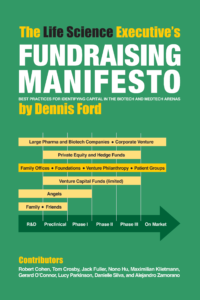About the FOC Accelerator
The Focus on Cures (FOC) Accelerator recruits best of breed international startups, who have been selected by their regional international entities (government, university, state, bio cluster) as top-tier/elite to come to FOC for a fundraising and partnership immersion course followed by getting wired into RESI conferences, the Global Family Office BioForum/Angel network and the Life Science Nation (LSN) partner network.
Over the past decade other Boston based international accelerators and incubators are essentially offering “Venture Tourism,” using the Boston life science hub brand to plug their clients into the Boston/Cambridge life science player infrastructure and help with pitch decks. They have a lineup of mentors and investors who provide coaching and instruction on how navigate a fundraise. These incubators and accelerators scratch the surface of what really needs to be done, which is:

State of the State of Early Stage Funding and Partnering
When raising capital, the earliest stage companies (seeking between $15k-2mm), and the early stage companies (seeking between $2-10mm) face major hurdles: the first is a general lack of experience and consistency presenting their company metrics: team, technology, data and market. The second major challenge these companies face is the necessity of leaving their local geographic region and committing to developing a strategy to target global players that are a fit for their stage of development and their product set. It is essential to create a Global Target List (GTL) of investors and partners that are a fit and then efficiently going after that list of potential partners.
From what LSN has seen in the last six years, companies develop their technology assets or get their tech transfer licenses and then decide to put their collective “toes in the partnering waters,” unprepared –without the knowledge of what it takes to play in the global marketplace. The earliest stage companies are seeking funds from friends, family, government grants, seed funds and angel investors but lack experience to execute. When these startups launch, there is a mixed bag of guidance for the scientist/entrepreneurs and fundraising CEOs. Many retired life science business executives and ex-professors go into business consulting, and all are well intentioned, but they too face the challenge of trying to keep up and in context with the fast-moving earliest and early global fundraising and partnering arena. Indeed, all levels of partnering have gone through dramatic change in the last 5 years. Virtually all the players in the life science arena today are going earlier and earlier when it comes to sourcing assets for their pipelines and portfolios.
The essence of the MKT 466 program is the CEO of LSN, Dennis Ford’s book, The Life Science Executive Fundraising Manifesto, that has been adapted into this two-week course. The essence of the MKT 466 Funding and Partnering Immersion Course along with interactive workshops is to prepare a startup company to create a dialogue with the right players in the global partnering arena, be it capital or channel partners that are a fit for their firm.
It all starts with the logo, tagline, elevator pitch, one-page datasheet, two-page executive summary, 10-12 slide pitch deck and website. This is followed by learning how to get a list of investors and partners that are a fit for your stage of development and products, developing an infrastructure to manage this list with SalesForce.com, and then a comprehensive plan to develop relationships and secure partnerships. That program is enhanced by use of the LSN Investor Platform and attendance of the RESI partnering conference series, which has been proven effective by over 350 companies raising well over $500mm using LSN programs and ecosystem.
FOC Accelerator Wants to Migrate Early Stage Regional Technology Startups to the Global Stage
Most of the firms LSN meets with and observes have a solid enough start on developing their branding and messaging materials but few are ready for prime time. Most firms need to ratchet up their branding and massaging across the board. Typically, the companies LSN sees need to rethink some of their basic assumptions and rationales and focus on netting out their distinct value proposition. It is LSN’s belief that most of the companies have issues with their branding and messaging and are 60% to 75% ready to be in front of potential partners. Virtually all need help and can greatly improve with just a little more focused work around the company’s theme and what they are trying to accomplish. A common issue with the presentations is the lack of a cogent story describing their company and what they do. The issues boil down to a lack of framing the company and product in the right light with enough detail that adequately positions their company to potential partners. This can be solved by creating an accurate picture of what the company is, what it does, as well as all of the other points that should be included in the pitch deck. In essence, not all of the information a potential partner seeks from a pitch deck is clearly addressed, which leads to lost opportunities.
Many of the companies do not have a 5-7 word tagline that adequately describes the company, thus failing to capture the essence of what the company actually does. LSN spends a lot of time working with the companies to net out their taglines and elevator pitch. In addition, we found that most of these companies financing needs are not budgeted far enough ahead, and as a result are seeking too little and thus will be in a never-ending fundraising process. The trap for these startups is failing to fully understand how long and time consuming a fundraising process can be which is 9-18 months. Investors like to see a company raise enough to reach their next major value inflection point, and would rather put more into a round to achieve this end and increase their return on investment. There is also a benefit to getting larger players in the game early, as they can be valuable partners in later development stages, so even though the companies are small, they should think BIG and long term.
A key skill that these companies need to develop is the ability to describe their technology and its value simply and clearly. While many life science investors have strong scientific knowledge, not all do and it is imperative to make sure even those without a technical background understand the product and its importance to the market. This should be a simple but compelling message. This message should also be succinct, as a pitch needs to encompass a lot more than just the technology and the need it addresses. Companies need to be sure they also discuss the team, the path to market entry, the marketing approach and how they plan to achieve this. It is important to note that investors do not expect an early stage company to have all of the answers or for these answers to be set in stone, but they like to see that the company has thought of these issues and how to address them.
Companies must decide how they wish to present their opportunity and devise a method for telling their story that works for them. This pitch must also be developed such that any employee can easily share it. In a small company, any employee may make the connection that leads to an investment, so creating a clear, concise message that anyone can share that includes a good hook to draw interest is critical. What all the companies were missing was a list of global partners and investors (GTL) and the skillset to canvass this list through ongoing phone and email campaigns. This is a big part of what the two-week MKT 466 Funding and Partnering Immersion class addresses.
In summary, with some time and effort, the message and the marketing material of most startup companies can be improved. Most companies have a great start, but a few weeks of LSN’s help can get the branding and messaging honed. Instead of focusing solely on regional partners, LSN can help the companies connect to a global network of investors and strategic partners, through the Investor Platform and the RESI conference series. Teaching them how to efficiently canvass and set up partnering meetings is crucial for success. Fundraising is fundamentally a numbers game so by expanding their target list to the global stage, they have a much better chance of finding partners that are a fit.
Partnerships
 Global Family Office BioForum (GFOB)
Global Family Office BioForum (GFOB)
LIFE SCIENCE NATION AND STETSON FAMILY OFFICE JOIN FORCES
Launch Collaboration to Provide Early Stage Funding for International Healthcare Startups
The joint initiative between Life Science Nation (LSN) and Stetson Family Office (SFO) will:
- Assist international life science startups in raising seed capital, series A and B funding rounds, and offer a Boston-based immersion fundraising and partnering program.
- Prepare and integrate these startups into LSN’s global partnering ecosystem, including the Redefining Early Stage Investments (RESI) Conference Series in Boston, San Francisco, Europe and Asia and access to LSN’s partner network.
- Use family office philanthropic and impact investment strategies, along with angel investors’ expertise, in seed rounds to move compelling technology out of the labs and onto the commercial development path. It will focus specifically on years 0 to 3, commonly referred to as “The Valley of Death”.
- Advance women as investors and as entrepreneurs in the life sciences.
- Direct preliminary interest in products that impact healthy brain, diabetes, obesity and heart disease, although all products are welcome.
As a kickoff to the strategic alliance, the Stetson Family Office will be the Title Sponsor of the 2019 Redefining Early Stage Investments conference series. The LSN and SFO collaboration will take the best of the high-growth international start-up life science companies, with which LSN is working, and provide them access to the global angel and family office network of Global Family Office BioForum (GFOB), established by the Stetson Family Office. GFOB is the preeminent alliance of international family offices. Currently in 18 cities in the U.S., Europe and Asia, it is dedicated to speeding up the early-state life science product development journey in years 0-3, working in cooperation with the Angel Capital Association with 13,000 members in 260 organizations.
 Healthcare Impact Foundation
Healthcare Impact Foundation
Healthcare Impact Foundation (“HCIF”) was formed in 2017 as a 501(c)(3) public charity and is dedicated to building a better private equity ecosystem for healthcare innovations and supporting the commercialization of healthcare innovations as they progress from the research laboratory to the patient.
With a focus on the “Valley of Death” – years 0 to 3 of promising new life science companies HCIF is establishing funds for geographic regions around the world to build endowments to support the earliest stage life science and thematic areas of investments, including Alzheimer’s Disease and cancer.
Structured as a portfolio of endowments, each HCIF separate account is dedicated to the community that creates it and is managed with a goal of growing the base endowment and distributing a steady and sustained stream of funding annually that can be distributed by the community’s trustees into the areas of its life science ecosystem in a way that will have the greatest potential impact.
Origins
“The Stetson Family Office has spent the last 18 months meeting with emerging healthcare innovation ecosystems around the US and globally. We found that while great ideas with high impact potential were coming from emerging life science markets like Arizona, the capital streams and support ecosystems are insufficient to support efficient growth of the companies. Too much time is wasted chasing funding. This time needs to be focused on getting high quality healthcare innovations further along the path to commercialization so that traditional venture capital and public equity funding can take it the rest of the way. We were honored to work with our partners here in Arizona to develop a new and sustainable funding model to address this critical need.”
— Chuck Stetson is head of the Stetson Family Office, a third and fourth generation family office in New York, and serves as Chairman of the Healthcare Impact Foundation.


